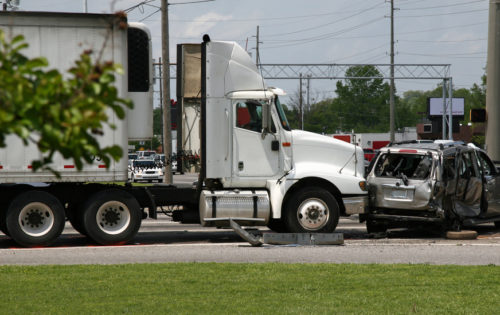If you’ve been rear ended by an 18 wheeler you may be thinking the trucking company is automatically at fault. That, however, may not be the case. There is no law that says the trucking company has to pay you after a rear end collision. Like in any accident, you have to prove that the accident happened through negligence. Of course, you have to be hurt, but that isn’t enough. You have to show the driver was negligent. Rear end collisions with 18 wheelers can not only be fatal, they can also be complicated cases. Trucking cases, in and of themselves, can be complex.
More often than not, a rear end collision is the fault of the person who hit the car in front of them. However, there is the situation where a car cuts in front of a truck and slams on its brakes. The truck would have no time to stop. This wouldn’t be the truck drivers fault.
Proving Fault in an 18 Wheeler Rear End Collision
Proving the truck driver was at fault can take more than the police report and what you recall about the accident. Your lawyer can use the cell phone records of the driver to show that they were distracted at the time of the crash. If the truck has a video camera recording the cab, the tape can also be used. Federal law prohibits truck drivers from using hand-held devices while driving. Together, these can demonstrate unsafe driving and a failure to follow the rules of the road.
Another piece of evidence that can be used to prove fault is the ECM. Your attorney can review the data from the truck’s ECM data (black box) and may find that the trucker didn’t hit the brakes until 2 seconds before hitting your car, implying that he wasn’t paying attention to the road. Witness testimony can be used to back this up.
Using the discovery process to find evidence to support your case also increases the value of your case. A simple police report may not tell the same story as a witness and a black box. Or as cell phone records and a video of the driver texting.
How Trucking Companies Defend Rear End Wrecks
It’s often in the trucking company’s best interest to defend their driver. The trucking company may point the finger elsewhere. They may even blame the victim. They may argue the accident was unavoidable due to the actions of the victim. You may hear them say the accident was caused by an act of God (weather) or by a mystery driver that nobody other than they truck driver saw or encountered.
Trucking companies may also go so far as to say the victim wasn’t hurt. You may hear things like pre-existing conditions. In other words, your back, for example, was injured before the accident. The rear end collision wasn’t what caused your back pain.
All of this to win or to make them look less culpable. The trucking company will present its case to the jury and try to place the blame elsewhere and reduce the amount they will have to pay by making your injuries look less severe.
Taking on a trucking company, even in a rear end collision can be a tough task. Chelsie King Garza can help.


